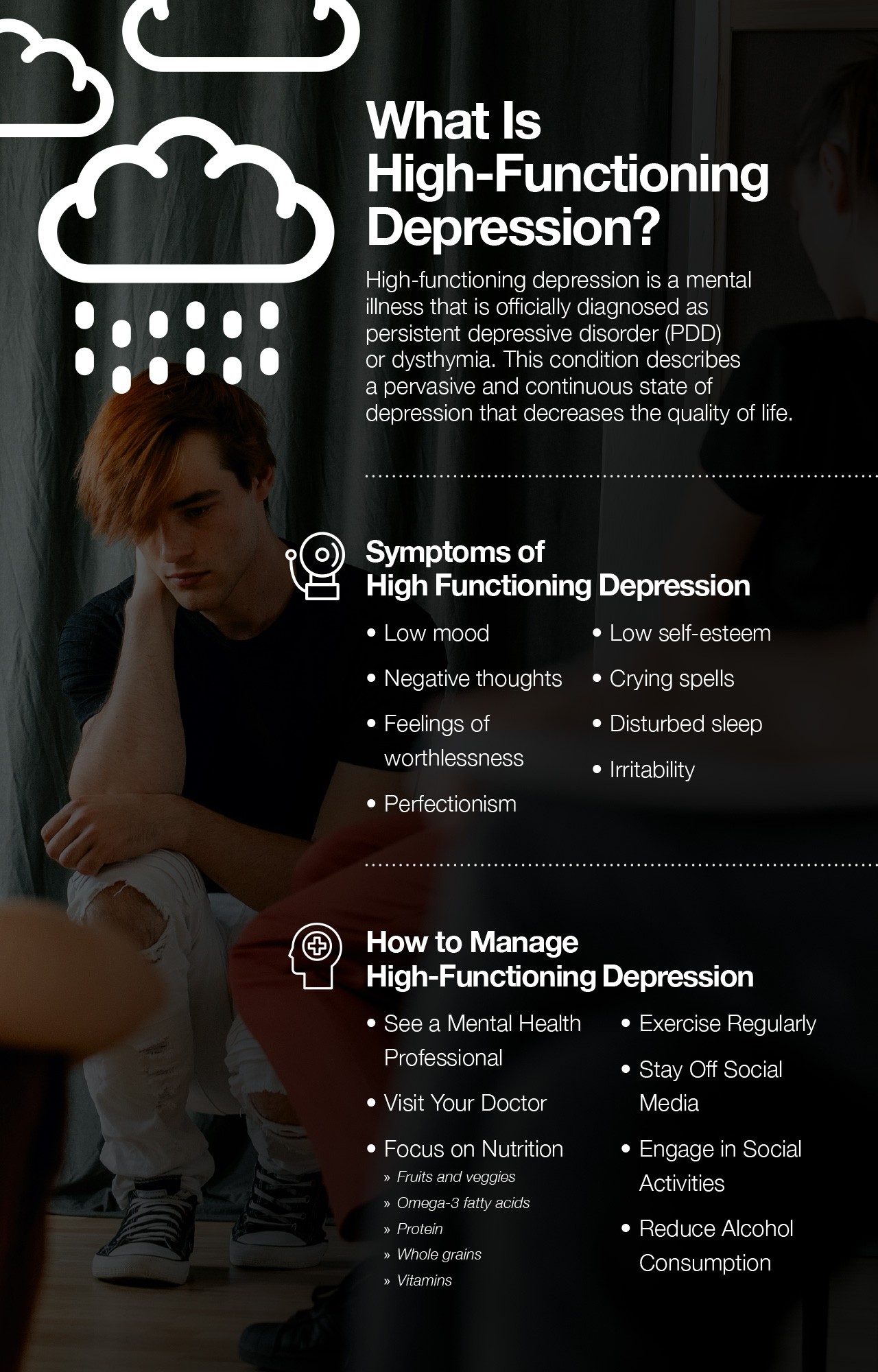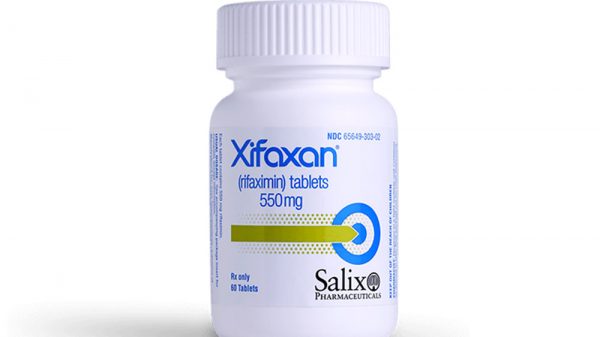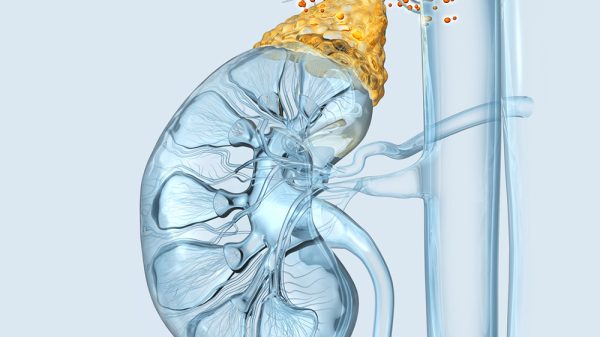High-functioning depression is a common mental health condition that impairs optimal function in everyday life. It can be difficult to spot high-functioning depression, because individuals suffering from it usually work, have good relationships, and don’t exhibit the usual symptoms of depression.
If you think you or a loved one is suffering from depression, then you’ve come to the right place. Read on to find out more about high-functioning depression, symptoms, and tips for managing it.
What Is High-Functioning Depression?
High-functioning depression is a mental illness that is officially diagnosed as persistent depressive disorder (PDD) or dysthymia. This condition describes a pervasive and continuous state of depression that decreases quality of life.
High-functioning depression differs from other forms of depression like major depressive disorder (MDD), unipolar depression, and bipolar depression. The symptoms and signs of high-functioning depression are usually milder and don’t necessarily impair your ability to carry out daily responsibilities. Individuals with MDD often exhibit crippling depression that impacts one’s ability to go to work, maintain friendships, and carry out daily duties. On the other hand, individuals with PDD may appear to be happy and content on the exterior, though they are internally suffering. PDD can be especially tricky to diagnose because it is not easily apparent to family members and friends.
Symptoms of High Functioning Depression
Though individuals with PDD and dysthymia may be high-functioning in career and relationships, these mental health conditions are still associated with unpleasant symptoms.
- Low mood
- Negative thoughts
- Feelings of worthlessness
- Perfectionism
- Low self-esteem
- Crying spells
- Disturbed sleep
- Irritability
How to Manage High-Functioning Depression
Being able to work and carry out does not eliminate depression as a possible cause of your symptoms. High-functioning depression still severely impacts quality of life.
1. See a Mental Health Professional
A mental health professional like a psychiatrist can evaluate your symptoms and diagnose your condition using the Diagnostic and Statistical Manual of Mental Disorders (DSM-5). A psychiatrist will work with you to create a treatment plan and may recommend medications like antidepressants. He or she will also be able to diagnose any other mental health conditions that may be co-occurring with dysthymia or PDD, such as high functioning anxiety.
Your psychiatrist can also help recommend resources for connecting with a licensed therapist to help you develop coping mechanisms and working through stress and trauma. Both talk therapy and psychotherapy are effective strategies for managing high-functioning depression.
2. Visit Your Doctor
If you think you may be experiencing PDD or another mental health issue, it’s critical to make an appointment with your primary care doctor in addition to visiting your psychiatrist. Mental health problems may be rooted in other physiological issues and medical conditions. For example, disorders like polycystic ovary syndrome (PCOS) result in hormonal fluctuations that can affect sleep and mood patterns. Inflammatory conditions like fatty liver disease may also have mental health impacts.
Taking care of any co-occurring medical conditions may help resolve symptoms of depression and improve your mental health.
3. Focus on Nutrition
Nutrition can have a profound impact on mental health. A diet filled with sugar, saturated fat, and preservatives can actually increase inflammation that worsens conditions like anxiety, major depression, and high-functioning depression. On the other hand, an anti-inflammatory diet that offers a balance of crucial macronutrients and micronutrients can support the effect of medication, minimize the side effects of medication, and help provide relief from your symptoms. Try filling your diet with these types of foods:
- Fruits and veggies: Fruits and veggies are chock-full of anti-inflammatory components that are good for brain health. Vitamin, minerals, and antioxidants help all cells in the body work efficiently. Reach for foods like spinach, kale, broccoli, sweet potatoes, bell peppers, and celery.
- Omega-3 fatty acids: Omega-3 fatty acids are critical for reducing inflammation in the brain and fighting against depressive symptoms. You can get lots of omega-3 fatty acids from food sources like salmon, mackerel, flaxseeds, chia seeds, pecans, and walnuts.
- Protein: Protein is made up of smaller units called amino acids, which the body uses to build hormones, neurotransmitters, enzymes, and muscle tissue. For example, the essential amino acid tryptophan is used to produce serotonin, which regulates sleep and mood. It’s vital to get plenty of high-quality protein on a daily basis. Egg whites, lean meats, nuts, seeds, and beans are great sources of protein and essential amino acids.
- Whole grains: Whole grains are a vital part of a healthy diet. Whole grains are packed with protein, minerals, fiber, and B vitamins. The dietary fiber present in whole grains improves digestive health while reducing inflammation in the gut. Fiber feeds good bacteria in the gut, which produce anti-inflammatory compounds that travel to the brain and reduce inflammation in the brain as well. Reach for foods like whole-grain bread, quinoa, brown rice, and whole oats.
- Vitamins: Certain vitamin deficiencies may trigger depression and interfere with energy levels and sleep patterns. Deficiencies in vitamin D and vitamin B12 are particularly common causes of depression. Getting your vitamin D and B12 levels tested at your doctor’s office can shed light on whether they are connected to your symptoms. You may be advised to take vitamin D and vitamin B12 supplements.
4. Exercise Regularly
Regular exercise is an important part of managing depression and other mental health disorders. Regularly engaging in moderate physical activity can increase the release of endorphins in the brain, which can boost mood and energy levels. Even going on a brisk walk can be a helpful tool for improving your mood.
Moreover, exercise is also associated with better overall health. Aerobic activity improves the function of the cardiovascular system, while strength training builds muscle mass and promotes a healthy metabolism.
5. Stay Off Social Media
Though social media can be a great platform for connecting with others and forming support groups, it can also worsen symptoms of mental health conditions.
Use social media only for connecting with close friends and family and finding support groups. Avoid mindless scrolling and comparing yourself to others. Remember that Instagram and Facebook pictures and posts are highlights of people’s lives, often creating an illusion of perfection. Avoid comparing yourself to other people’s highlight reels. Spending too much time looking at social media can worsen mental health and exacerbate symptoms of depression. Plus, staring at a screen for hours may be detrimental to eye and brain health.
6. Engage in Social Activities
Human beings are social creatures, and we need social interaction to boost our mood. Connecting with family and friends is an important part of managing depressive symptoms.
During the COVID-19 pandemic, the risk of spreading coronavirus may prevent normal socializing. Instead, try having socially distanced, outdoor gatherings with one or two friends. Playing games via online platforms like Zoom or having FaceTime calls can also help individuals remain socially connected while staying safe.
7. Reduce Alcohol Consumption
In order to manage depression, it’s critical to limit alcohol consumption. Individuals with depression may be more prone to drinking in an effort to soothe anxiety and escape from negative thoughts and feelings. However, any relief that alcohol provides is short-lived, and ultimately worsens symptoms. Alcohol consumption increases inflammation in the brain and disturbs the body’s careful hormone balance that regulates sleep and mood. Drinking in excess often triggers depressive episodes, anxiety, and panic attacks.
Things to Keep in Mind
Remember that the ability to fulfill daily responsibilities does not eliminate depression as a possibility. If you are suffering from symptoms of depression, make an appointment with your doctor or a mental health care provider as soon as possible.
If you are having suicidal thoughts, call the National Suicide Prevention Lifeline. (1) If you think you or a loved one is a direct and immediate threat to themselves or others, call 911.
What to Know About High Functioning Depression: Conclusion
Although high-functioning depression may not exhibit any outward symptoms, it can significantly impact mental health and wellbeing. If you think you may be suffering from high-functioning depression, medical professionals and lifestyle strategies can provide relief. Medication, therapy, and nutrition can successfully manage your symptoms and promote mental health and wellness.

References:























